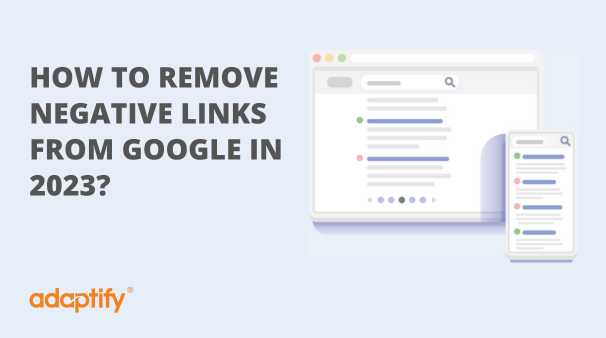Content
- How Removing Negative Google Search Results Can Improve Your Online Reputation
- Why Do You Need to Remove Negative Content in Search Results?
- Fastest Way to Remove Google Search Results: Contact the Webmaster Directly
- Your Best Choice: Have the Webmaster Delete the Page
- Your Second Best Choice: Search Phrase Removal
- Your Third Best Choice: Add a Tag to Get the Page Ignored
- Remove Google Search Results Directly from the Search Engine
- Suppress or Remove Search Results
- Why Google Search Result Suppression Works
- Get Your Free Reputation Consultation on How to Remove Negative Content
- Frequently Asked Questions
Negative online information may impact your legacy and business growth. So, removing negative content the fastest way possible before it hits your potential customer’s eyes is essential.
There are several methods to remove negative information appearing on Google search results. Removing inaccurate information is vital to manage your reputation. Read this article to get detailed information.
However, if these methods are ineffective, we will teach you how to push the Google search result down to make it less visible. We will do it through suppression campaigns that create positive content. It will more readily fulfil searchers’ intent. Let’s discuss all in detail.
How Removing Negative Google Search Results Can Improve Your Online Reputation
A comprehensive study by Advanced Web Ranking, revealed that a staggering 84.8 per cent of all clicks go to the first ten search results on search engines. It emphasises the significance of ranking well within those initial results to gain visibility and attract users. Moreover, the study highlighted an unfortunate trend, showing that negative headlines outperform positive ones by 63 per cent.
Consequently, negative content within the top 10 search results can significantly impact your online reputation. It means people are more inclined to read and be influenced by negative information. It underlines the importance of effective reputation management strategies to mitigate the impact of negative content and ensure a positive online presence.

It means that negative publicity can have far-reaching consequences if you are an executive or CEO. It can impact your personal credibility and crucial aspects of your professional life. Business relationships may be strained, advancement opportunities could be hindered, and even compensation packages may be affected. Moreover, the company could suffer significant repercussions from a damaged corporate reputation. It can cause a decline in market capitalization, difficulties in hiring top talent, and a decline in sales and revenue.
You need to recognise that their online reputation carries real-world implications. It impacts your professional success and business well-being. Taking proactive steps to manage and safeguard your online image and addressing potential security vulnerabilities is of utmost importance in today’s digital landscape.
Why Do You Need to Remove Negative Content in Search Results?
- Protecting Reputation
- First Impressions Matter
- Business Impact
- Career Opportunities
- Competitive Advantage
- Mitigating Crisis
- Online Perception
- Personal Security
Fastest Way to Remove Google Search Results: Contact the Webmaster Directly
The original content creator or poster has the authority to remove their content voluntarily or if legally compelled to do so. If they decide to remove it, Google will typically update its search results within a few days or weeks, reflecting the negative or outdated content removal.
However, it’s vital to recognise that webmasters may not always agree to remove online content, as they might have placed it there intentionally for specific reasons. Contacting the webmaster should be approached cautiously, which could lead to unintended consequences. For instance, sending a legal demand letter to a webmaster might prompt them to refresh the page’s content, causing it to increase search results or attract more attention.
Before requesting content removal from a webmaster, weighing the potential outcomes carefully is crucial. Sometimes, such requests may not be the most effective solution, and alternative approaches may be necessary.
Your Best Choice: Have the Webmaster Delete the Page
The most effective approach is to request the webmaster of the website hosting the content to completely remove the offending page. It will help to remove search results from Google indexes.
For a more immediate resolution, if you possess a free Google Search Console account, you can utilise the Google Removal Tool. This tool enables faster removal of pages already taken down from a website. Rather than waiting for the Google bot to crawl the site again, the Google Removal Tool can speed up the process of removing these pages from Google’s index.
By employing these methods, you can take proactive steps to address and manage the content appearing in search results. It will help to maintain a positive online reputation and ensure a better digital presence for individuals and businesses.
Your Second Best Choice: Search Phrase Removal
To facilitate the removal of unwanted Google search results, you can approach the webmaster of the website in question and request the removal of specific search phrases from the page. For instance, if your company name is mentioned in the page’s content, HTML description, or title, the webmaster can modify the text to eliminate any reference to your company. As search engines crawl the updated page, they will no longer associate it with the targeted search phrases. It will lead to a gradual demotion and eventual removal of the undesirable search result.
Engaging with the webmaster to make these changes offers a proactive and targeted approach to managing your online reputation. By removing the specific keywords or phrases associated with negative content, you can improve the search engine ranking of more favourable content. It will contribute to a more positive online presence for yourself or your business.
Your Third Best Choice: Add a Tag to Get the Page Ignored
You can request the webmaster of the website to insert a NOINDEX tag in the HTML header of the respective page to delete all Google searches. Even if your company name or other information remains on the page, the NOINDEX tag signals search engines not to crawl or index the page further. As a result, within a few weeks, the page is typically removed automatically from search results.
By employing the NOINDEX tag, you can effectively control which pages are accessible to search engines. It will allow you to manage and refine the content that appears in search results. This approach provides a strategic and timely solution for addressing negative search results and enhancing your online reputation.
Remove Google Search Results Directly from the Search Engine
If direct contact with the webmaster is not possible or not advisable, you can request the removal of search results directly from Bing or Google. This process is known as de-indexing, as it involves removing a specific page from the search engine’s index.
However, it’s essential to note that de-indexing is only possible in limited cases and must adhere to the search engine’s guidelines and policies. It may not be the most common approach. De-indexing can be a viable option in certain situations where other methods for content removal are not feasible or effective. It’s essential to follow the appropriate procedures and guidelines provided by search engines to ensure that de-indexing requests are handled appropriately.
Suppress or Remove Search Results
Suppression campaigns have an extremely high success rate. But they require a significant amount of time to achieve results. The advantage of these campaigns is that they effectively reduce or even eliminate the visibility of negative online content.
Moreover, they replace the negative content with positive and favourable material. While suppression campaigns may not offer immediate results, their ability to create a more positive online presence makes them a valuable strategy for managing and enhancing your online reputation over time. Patience and persistence in executing suppression campaigns can lead to a substantial improvement in search results and a stronger overall digital image.
Why Google Search Result Suppression Works
Bing and Google prioritize providing valuable search experiences to their users. To achieve this, they aim to deliver the most relevant search results that align with the searcher’s intent. Relevance is key to determining the best search results. Consequently, efforts are invested in research, development, publication, and promotion of fresh, positive content. It better satisfies the searcher’s intent and is rewarded with higher rankings in search results.
By creating content that fulfils the needs and expectations of searchers, you can significantly improve your visibility on search engines. It will increase the likelihood of attracting more users to your website. Finally, this user-centric approach benefits both search engines and content creators. It fosters a cycle of valuable search experiences and positive content promotion.
Get Your Free Reputation Consultation on How to Remove Negative Content
Search result suppression involves strategically altering the order of information importance displayed in search results.
The most impactful approach to rearranging information priority is by generating superior sources of knowledge that align with the specific queries searchers are seeking.
Adaptify specialises in this process. Our expert team aims to enhance knowledge accessibility. So, we ideally promote truthfulness by curating search profiles that cater to the needs of search engine users. Our focus is on creating content that offers valuable insights, thereby improving search experiences and positively influencing the perception of individuals and businesses in the digital realm.
Our goal is to contribute to a more accurate representation of information and provide search engine users with valuable and reliable content. Contact us to get a free online reputation consultation and take the first step towards improving your online presence and business growth.
Frequently Asked Questions
The fastest way to remove Google search results is by contacting the webmaster or site owner directly and requesting the immediate removal of the content in question. If the webmaster complies and acts promptly, the content will be removed from Google’s search results within days or weeks.
However, it’s important to note that webmasters are not legally obligated to remove content simply upon request, especially if the content is lawful and doesn’t violate any copyright or legal requirements. If direct contact with the webmaster is not possible or not successful, other methods for content removal, such as legal takedown requests or using the Google Removal Tool in Google Search Console, may be considered.
The most expedient method for removing harmful content online is by directly contacting the webmaster responsible for the website hosting the content. Requesting the webmaster to take immediate action can lead to swift content removal.
The second fastest approach involves requesting the direct removal of search results from Google. This can be accomplished through the Google Removal Tool in Google Search Console. When content has been removed from the source website but still appears in search results, this tool can speed up the process of de-indexing the content.
A slightly longer but effective method is the suppression of search results. This strategy involves employing reputation management techniques to promote positive content and optimise search results. As a result, it pushes down harmful content and diminishes its visibility over time.
By implementing these strategies in the appropriate situations, individuals and businesses can take swift action to mitigate the impact of harmful content. It can help you proactively manage your online reputation.
Search result suppression is a reputation management strategy aimed at minimising the visibility of undesirable or negative content in search engine results. It involves pushing down harmful or unfavourable search results from prominent positions to lower positions in the search engine results pages (SERPs). The goal of suppression is to promote positive and favourable content that better represents you or your business.
Suppression campaigns typically involve creating and optimising high-quality, positive content across various online platforms. It may include websites, blogs, social media, and other relevant channels. By strategically curating content and implementing search engine optimisation (SEO) techniques, positive content gains prominence. As a result, it gradually demotes negative content.
Removing negative information from the internet can be a challenging task. But there are several strategies you can employ to mitigate its impact and manage your online reputation effectively:
Contact the Webmaster: If the negative information is hosted on a website, reach out to the webmaster or site owner directly and politely request the removal of the content. Explain your concerns and provide any relevant evidence to support your request.
Submit a Legal Takedown Request: If the negative content is defamatory, infringes your copyright, or violates any laws, consider seeking legal advice and sending a formal takedown notice to the hosting provider or platform where the content is published.
Use Google Removal Tool: If the harmful content has been removed from the website but still appears in Google search results, you can use the Google Removal Tool in Google Search Console to expedite the de-indexing process.
Social Media and Content Platforms: Report the negative content as violating the terms of service on social media and content platforms. Many platforms have mechanisms for handling content removal requests.
Reputation Management: Invest in reputation management strategies to promote positive content that accurately represents you or your brand. Create and optimize high-quality content across various online platforms to push down negative results in search rankings.
Seek Professional Help: If you find it challenging to manage the negative information on your own, consider engaging with ⦁ online reputation management firms or specialists who can provide expertise and tailored solutions.
Stay Proactive: Continuously monitor your online presence and be vigilant in addressing any new negative content that may arise. Respond appropriately and promptly to any negative reviews or feedback.
Removing negative information entirely may not always be possible, especially if it’s protected by free speech rights or is based on information. In such cases, focus on building a strong positive online presence that outweighs the impact of negative content and presents a more accurate and favourable image to others.











